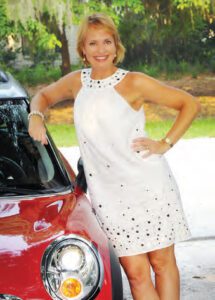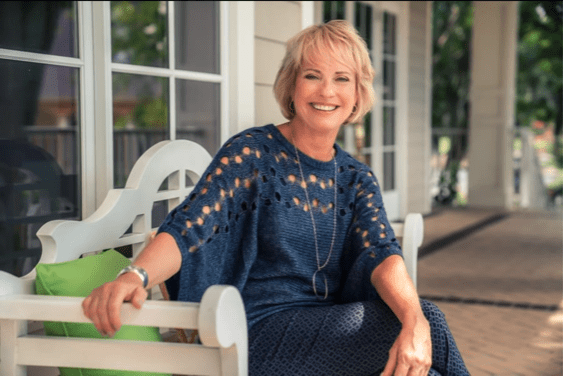Protocols were fairly consistent for early detection back in 2001 when I was diagnosed with invasive ductal carcinoma Stage 1 breast cancer. I discovered the lump myself and had a lumpectomy, followed by chemotherapy and radiation. Other breast cancer colleagues I knew at the time went through similar iterations of this treatment depending on their stage and type of cancer. Genetic testing was limited, and the effects of chemotherapy could be debilitating. I went through 33 days of radiation and through the normal follow-up every six months, blood tests, and diagnostic mammograms.
Two decades later, I discovered I had breast cancer again. Both times I found it myself – that’s what’s interesting. There I was, at my home in Wisconsin, and I felt a lump on my chest wall — not my breast — so my immediate reaction was that it was a cyst. What do you know? Virtually the same! But through BRCA genetic testing, doctors determined there likely was not a connection to the first breast cancer and I did not have the harmful variant gene indicating a greater risk of breast cancer. This news was a huge relief for me. This testing helped to validate that there was no connection between my first and second incidents with breast cancer. Furthermore, through the new Oncotype DX Breast Recurrences Test, my medical team determined, based on genetics, that chemo would not provide additional benefit to me, and I was so relieved.
There were vast changes between what I experienced in 2001 and what I went through in 2020. All these millions of dollars spent on new technology are truly turning the tide of treating breast cancer. What amazes me is how much is available to cancer patients to customize their treatment, and how genetics tells diagnosticians and physicians so much about your personal situation, what you have, and how they determine treatment.
One piece of advice I would offer every woman who finds herself going through breast cancer, or any health ordeal for that matter, is to stay positive but to be kind to yourself. People who are high-energy, positive thinkers tend to just want to bully their way through it. I’m that way, but I learned to be compassionate with myself. So, my advice is to surround yourself with  the people you are comfortable being with, and don’t feel that you need to be available to everyone. I found a friend who was my personal advocate who let people know what I was going through and helped guide them as to what would be helpful at the time. If you feel like you have to step back and don’t feel well or want to talk to people, don’t force yourself.
the people you are comfortable being with, and don’t feel that you need to be available to everyone. I found a friend who was my personal advocate who let people know what I was going through and helped guide them as to what would be helpful at the time. If you feel like you have to step back and don’t feel well or want to talk to people, don’t force yourself.
It’s extremely important that you find the best doctors and have faith in what they are telling you, and when I say that I mean to do everything that they tell you to do. The first time, I did everything my doctors asked me to do relative to treatment, so I have not second-guessed myself the second time around. They are the experts, and in choosing the doctor for you, have faith that they know what they are doing. Certainly, reach out for second opinions, but once the decision is made, believe in them — because they are trying to get you well.
I was in Wisconsin when I discovered the lump. Thankfully I ended up with one of the top cancer specialists in the market. I researched her, met her, and was instantly convinced she was the doctor for me. She was a breast cancer survivor herself, and very pragmatic, but I felt that she understood the emotional side. She performed the surgery within a short time of my diagnosis, for which I will be forever grateful. You have to be your own advocate to get the best results. My permanent home is in Florida, so I had to make sure, for my treatment and follow-up, that my hospital was connected with the best — and they are — the Mayo Clinic. That was a big thing for me — confidence in my medical professionals and confidence in the hospitals where I go for my care and supervision.
Both times I had breast cancer, the tumor was removed — a lumpectomy. The surgeons made sure they had good margins and thankfully there was no cancer in my sentinel node — which is an indicator if the cancer has spread. I made the decision not to have reconstructive surgery given that I did not have the hereditary genetics for breast cancer. This is a very personal decision. I will tell you that chemo was difficult for me 21 years ago. It affects your energy levels and how you feel, and there are a lot of emotions to deal with when you lose your hair. But, on those days when I felt really bad, I had to say to myself, “You know what? It’s okay! Love yourself!”
For me, my positive attitude and faith have made all the difference. My friends and loved ones made all the difference. But above all, being kind to myself is what counted most of all. I am grateful to be here to tell my story and will always be available to women who have to fight the same battle.

